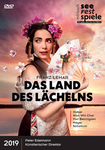|
Back
11/21/2019
Franz Lehár: Das Land des Lächelns (The Land of Smiles)
Elissa Huber (Lisa), Won Whi Choi (Prince Sou Chong), Maximilian Mayer (Count Gustav von Pottenstein – “Gustl”), Katerina von Bennigsen (Mi), Benno Schollum (Count Lichtenfels), Koichi Okugawa (Uncle Tschang), Harald Serafin (Obereunuch), Gernot Kranner (Fu Li), Katharina Kovar (Lore), Ioanna Papaioannou (Toni), Olivia Pflegerl (Fini), Mörbisch Festival Choir and Ballet, Supernumeraries and Children’s Supernumeraries, Walter Zeh (Chorus Master), Golden Dragon Acrobats – SRO Artists, Mörbisch Festival Orchestra, Thomas Rösner (conductor), Leonard Prinsloo (stage director and choreographer), Walter Vogelweider (set designer), Christof Cremer (costume designer), Jürgen Erntl (lighting designer)
Recording: Bauernkapelle, St. Georgen, Austria (2019) – 158’ (including bonus track)
Videoland Klassik #VLMD 025 – Dolby Digital 2.0 – Picture format 16:9 – Region 0 (Distributed by Naxos of America) – Booklet in German and English – Subtitles in German and English

   
Franz Lehár’s operetta housing the romantic conflict between West and East returned to Mörbisch this year after last appearing in 2001. Although Mörbisch’s opulence prevails, the overall production doesn’t mesh as impressively as its predecessor. Principals and costuming are first-rate, but the rub is in the intangibles with lines of ‘political correctness’ and ‘political incorrectness’ being crossed which adds to the interpretative conundrum.
What’s the marked difference between the two? While 2001 was guided by stricter politesse and delicate formalities, Leonard Prinsloo loosens diplomatic boundaries by giving way to willful women and feminism that causes an overall roughness. Vocally, Elissa Huber’s projection astounds, carrying sophisticated Viennese panache that’s accentuated by the beautiful sampling of Christof Cremer’s stylized couture of Chinese porcelain patterns, but the character is too coarse and progressive, especially when the aria, “Vater, such mir eine Braut” (“Father, seek me a bride”) from Lehár’s earlier Die gelbe Jacke is inserted with modified wording, “Lisa, find me a bride.” Such is the response from Lisa’s heartthrob, Gustav (Maximilian Mayer,) The tables have been turned with the male as the subdominant.
Gifted with a crystalline soprano glow, Katerina von Bennigsen’s Mi is, similarly and unfortunately, radicalized. Tinkering with the score, Mi is erased from Act I, and placed only within Acts II and III… the observer doesn’t adjust sensibly into her long-willed Westernized transformation until we abruptly run into her in China. Upon the conclusion of her aria, “Im Salon zur blau’n Pagode”, she willingly sheds her country’s garb and defiantly snubs Buddha...a defiant frau.
Harald Serafin, the “bon vivant of Viennese operetta”, relinquished his position as Mörbische’s artistic director in 2012, but he’s never far from the limelight. In this new production he’s sadly replaced by Benno Schollum as Count Lichtenfels who doesn’t appear to be much of a father figure. Instead, M. Serafin’s cameo is assigned to the minor rôle of the chief eunuch. But in order to elevate the character (and greater time in the spotlight), M. Prinsloo robs [again] from the cradle of Der Graf von Luxemburg and Basil Basilowitsch’s aria, “Ich bin verliebt” (“I’m so in love”) only this time massaging the message into “Ich bin eunuch” (“I am a eunuch”.) Regardless of whether one is lightly entertained or mildly stunned, M. Serafin hasn’t lost his sense of swagger along with his oft-inserted innuendos and shtick. So while these actions/decisions have been employed, does it not disrespect the absolutes about Das Land des Lähcelns on its own independent merit?
For Mörbisch to select Won Whi Choi as Prince Sou Chong was a fortuitous move. His presence is imperial while the timbre has no trouble penetrating to the sky with his silky declamations. Maximilian Mayer is a perfect candidate-of-choice for Count Gustav von Pottenstein. His animation adds lighter theater, and he has a boy-like charisma that adds lightness to Lehár’s score.
Back in 2001 the libretto called for some very sexist remarks from Uncle Tschang directed towards Lisa, but in 2019 the wording shifted (likely promulgated by the #MeToo movement) by avoiding such an insulting fracas. Prince Chong’s four future wives never physically appear, and they are only discussed in dialogue…thus, Prinsloo shies away, altogether, which actually detracts from one of the strongest points of conflict in the operetta. “Snowflakes”, anyone?
Absent from Prinsloo’s canvas is The Hunan Provincial Song and Dance Troup, though we experience acrobatics by SRO Artists who give an incredible Cirque du Soliel-like performance. The gyrations are stunning while the floor is enveloped by a mass of supernumeraries in a colorful Chinois Cremer-created wardrobe.
Scenically, Walter Vogelweider’s monumental Golden dragon emblazons the stage, giving a firm anchor for the action housed inside Acts II and III; however, Act I is a gawdy jumble: in the first scene, one side houses a flickering neon sign, “Drachenbahn” (“Dragon Track”) [hinting at the Far East drama] while the other side supports a sub-proscenium arch with elements culled from Georges Méliès’ Le Voyage dans la lune (A Trip to the Moon)(October 4, 1902). While academicians have pointed out its connection to anti-Imperialism satire, the point is subtle, yet it helps drive the narrative across about the ideological policies in Austria and China. In the director’s mind this Das Land des Lächelns emphasizes the idea of breaking anthropological taboos.
The Mörbisch Festival chooses their own ballet troupe to ring in Lehár’s “Gold und Silber” waltz. Choreography, under the helm of M. Prinsloo, flows with men’s black and white tuxedos and women’s white flowing gowns with Prussian Blue sashes...the palette carries over from the earlier dress during the Lisa/Gustl duet, “Bein einem Tee à deux.” Extremely tasteful.
While the 2019 Mörbisch Festival has significant pockets of grandeur along with stellar singing, the presentation takes a few more liberties and dilutes the operetta’s core-integrity.
Christie Grimstad
|